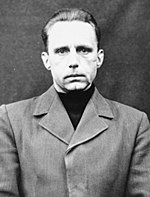Wilhelm Beiglböck
This article includes a list of general references, but it lacks sufficient corresponding inline citations. (February 2013) |
You can help expand this article with text translated from the corresponding article in German. (April 2012) Click [show] for important translation instructions.
|
Wilhelm Beiglböck | |
|---|---|
 Mug shot of Wilhelm Beiglböck | |
| Born | 10 October 1905 |
| Died | November 22, 1963 (aged 58) Buxtehude, Germany |
| Occupation | medical doctor |
| Conviction(s) | crimes against humanity at Dachau concentration camp. |
| Criminal penalty | 15 years imprisonment, later commuted. |
Wilhelm Franz Josef Beiglböck (October 10, 1905, in Hochneukirchen (Hochneukirchen-Gschaidt), Lower Austria, Imp.&R. Austria – November 22, 1963, in Buxtehude, Lower Saxony, Germany) was an internist and held the title of Consulting Physician to the German Luftwaffe (Airforce) during World War II.
Beiglböck attended Stiftsgymnasium Melk[1] and studied medicine at the university of Vienna. During his studies there he became active in Wiener Burschenschaft Moldavia. First he worked as an assistant at the Medical University Clinic in Vienna for Franz Chvostek junior and afterwards for Hans Eppinger.
From 1933 he was a member of the Nazi Party and from 1934 of SA, promoted to the rank of Obersturmbannführer (Lieutenant Colonel). In 1939 he made his habilitation and in 1940 he became top doctor under Hans Eppinger. From May 1941 Beiglböck worked as Stabsarzt (medical officer) of the Luftwaffe. In 1944, he became an extrabudgetary professor at the Vienna University. During the war he performed medical tests involving seawater on inmates at Dachau concentration camp.

Beiglböck was a defendant in the Nuremberg Doctor's Trial. He was convicted of war crimes and crimes against humanity, and sentenced to 15 years imprisonment. His sentence was commuted to 10 years and from 1952 - 1963 he served as the chief physician at the Hospital of Buxtehude.
At the beginning of 1947, the Vienna prosecution initiated proceedings against Beiglböck because of war crimes, mistreatment, and violating human rights. The Vienna proceedings were finished in October 1947.[2]
References
- ^ Wilhelm Beiglböck auf encyclopedie.bseditions.fr
- ^ "DöW - Dokumentationsarchiv des Österreichischen Widerstandes". de.doew.braintrust.at (in German). Retrieved 2015-01-02.
- Alexander Mitscherlich / Fred Mielke: Medizin ohne Menschlichkeit - Dokumente des Nürnberger Ärzteprozesses, Lamberg und Schneider, Heidelberg 1949, ISBN 3-596-22003-3.
- Ernst Klee: Das Personenlexikon zum Dritten Reich - Wer war was vor und nach 1945. S. Fischer, Frankfurt a.M. 2003, ISBN 3-10-039309-0.
- François Bayle: Croix gammée contre caducée. Les expériences humaines en Allemagne pendant la deuxième guerre mondiale. Neustadt 1950.
- 1905 births
- 1963 deaths
- People from Wiener Neustadt-Land District
- Physicians in the Nazi Party
- Sturmabteilung officers
- Austrian Nazis convicted of war crimes
- Austrian people convicted of crimes against humanity
- Dachau concentration camp personnel
- Nazi human subject research
- People convicted by the United States Nuremberg Military Tribunals
- 20th-century Austrian physicians
- Luftwaffe personnel convicted of war crimes
- Austrian medical biography stubs
- German medical biography stubs
